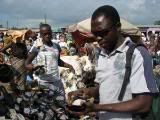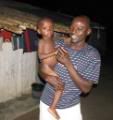The Last Adventure, part I - Emmanuel's new life
The last time I saw Emmanuel, when he was in town conducting business, he insisted that I come visit him. Emmanuel is my friend and former guard who left our service about a year ago to move to Agona, which is in the Western Region, about 80 miles from the Ivorian boarder. He sells ladies shoes there in the market [click here to read more about what he is doing].
[Emmanuel showing me the shoes he sells]
I remember last year when Emmanuel pulled the night shift guarding us, I would listen to him pray. It was usually 3 or 4 in the morning, the light was out, and the hot sticky still nights kept sleep away. I would get up and watch him pace the front of the compound, praying in a mixture of Twi and English, and sometimes I could hear my name spoken. No matter the language, there is a fervent quality to prayers given at that hour, as if he were personally keeping the demons at bay and our house safe.
[Kaya holding his son Kaya Jr – the name Kaya means Please Stay, and is usually given after several babies have not]
It was a three-hour bus trip to Takoradi, and then another hour beyond that by TroTro to Agona. Like the last time I visited him, (to read about it [day1, day2, day3, day4]) I was paraded around to visit all his friends, but unlike last time, it didn’t annoy me so much. I like that change in me, the one who doesn’t have to be in control, or even know what is happening next, who is just there, very much in the moment. One of the things I notice about people from the states when they visit is a constant need to know what is next, and how it is going to happen, even when they have almost zero understanding of the culture, or what it takes to get that thing to happen.
At one point, when we are all together, Emmanuel said “Steve, these are my friends, the ones who did not know me when I came, but took me in, the stranger. We have a saying here,” and then he said something in Twi that I couldn’t understand and began to translate. His friends all jumped in, arguing about his translation of the saying, but the gist of it was Only a stranger is served the blind chicken (or one-eyed chicken). I gather the blind or one-eyed chicken is the Ghanaian equivalent to unclean, and when you have friends, they watch out for you (like the blind chicken can’t).
[“Teacher” standing with boy named Nyame (meaning God in the local language), while his mother looks out]
Now that I had been properly introduced, and greeted all his friends, as well as visiting them in their homes, we had a delicious meal of groundnut soup with Omo Tuo (or rice balls), and fish. I think back to a conversation I had with Nicole Sims at the Mozley’s when we first got here. We are sitting around the table having Groundnut Soup,
“Do you eat the bones?” She asks the Ghanaians sitting at our table, and they laugh. One of the women, says yes, but her husband won’t. After they were first married she tells about her husband seeing her eat the bones and asking, “Are you an animal that you eat the bones too?” They argue about it and she asks him, “Are you Ghanaian?” It is a custom not shared by all. Nicole asks how to eat the bones, and she says “don’t force it” Later as Nicole is biting into a breast bone, the woman cautions her: “Don’t force it!”
“Am I forcing it?” she asks with bones still in her mouth so it doesn’t come out clearly.
“I see your face” and she is right, it has that tight strained look. [click here to read full entry]
I notice there are rarely any bones to clear away when eating with our Ghanaian friends, so tonight, I try as I have been taught. I chew and chew the sharp fish bones until they are ground down to swallowing size. I look at Emmanuel’s bowl, and Kofi’s, who has joined us for dinner, and their bowls are empty, no bones, and I am only half done. Eating isn’t the social occasion that it is in the States, so there is little conversation to slow us down. They eat quickly. Chewing the bones slows me down, but when I have finished, I and see a completely empty bowl, without bones, and I am proud and think Well Done, Steve . Then it was off to the guest house where I would be staying for the week, but the TroTro is has only one place and there are two of us. The mate stays behind and gives me his jump seat. Its late now, maybe 8pm, and I don’t think they expect me to know what to do, but when someone shouts blastoff, which I take to mean next stop, I expertly swing open the door before it stops, and hop out so the people can exit. I hop back in, shout Away, and close the door as we’re pulling out and flip down my jump seat. The people laugh, wondering about the Obruni mate, and I think, Should I be collecting fares?
It was a simple room, not self-contained as they say here, meaning the shower and toilet are around the corner and to be shared by everyone on that floor, which was OK since I am the only guest. The room came with its own bed sheets and a towel, which is relatively rare in this price range ($10/night), usually you are expected to pack your own bed sheets and towels. The room also came with an ashtray, another rarity as smoking is not all that common here, a New Testament, quite common, and a bowl of condoms, I guessing in case the New Testament or smoking didn’t work. Compared to Ghana’s neighbors, the rate of HIV/AIDS is low. Ivory Coast, Togo, Benin, and Burkina Faso each have infection rates between 20-30% whereas Ghana is reported to be 6%. Maybe this is why.
Emmanuel had come earlier in the week and paid the bill, so we go right to the room and chat for a while longer before he asks his leave. It is the custom here not to announce that you are leaving, or have to go, but allow the host (that would be me in this situation) to grant permission to leave, but I’ve never quite mastered the protocol. I do know that you are supposed to walk with your guest to the street, and perhaps further, maybe even to their home, but again I do not have a good understanding of what that looks like. So Emmanuel asks “May I go,” and then adds, “or would you like me to stay?” I had to ask: “So what is the program for tomorrow?” Emmanuel talks about visiting Cape Three Point, a place I have heard wonderful things about, but not had the chance to visit, and then he adds, “You have tasted many of the delicious dishes that my country has to offer and tomorrow you shall taste one of our African girls.”
I was quite sure I had heard him wrong, or didn’t understand the custom, or what he was saying and by morning I had convinced myself that what he really said was “and tomorrow you shall taste one of our African grills,” at least that is what I hoped he said.


0 Comments:
Post a Comment
<< Home